AWM41 998 - [Nurses Narratives] Sister I G Lovell

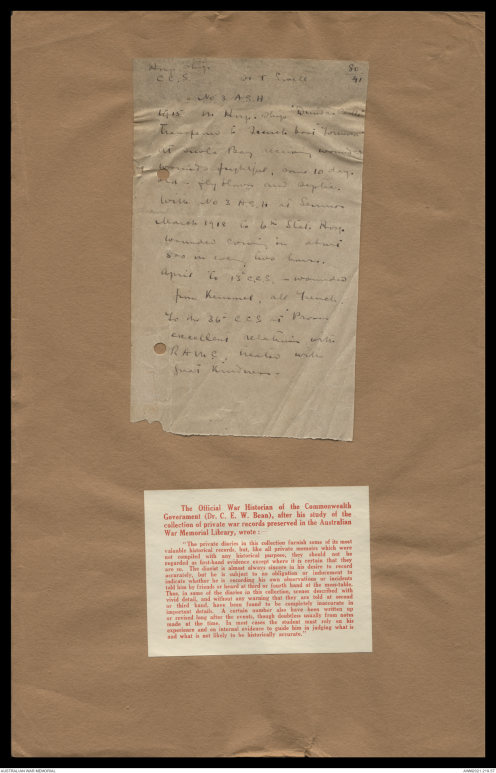
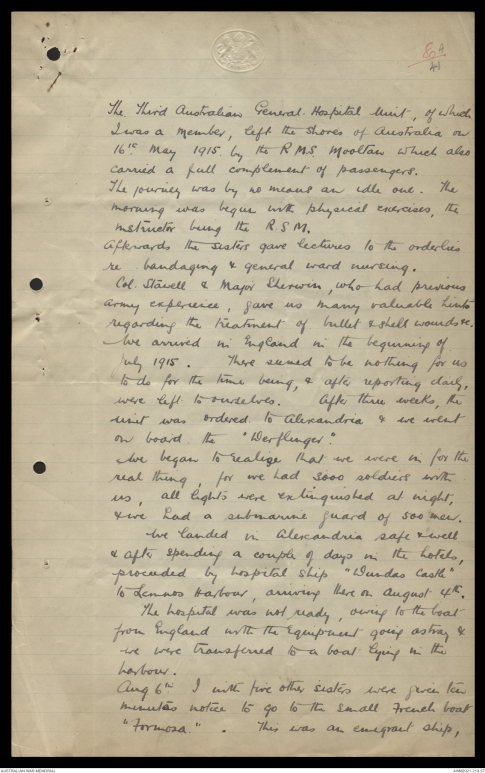
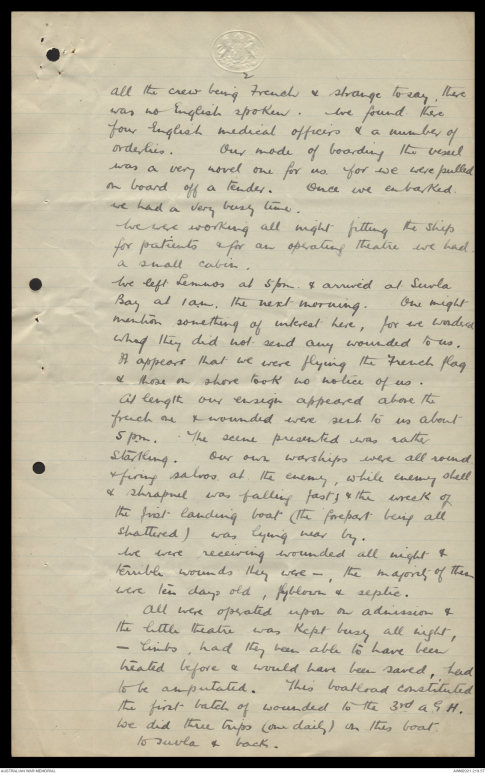
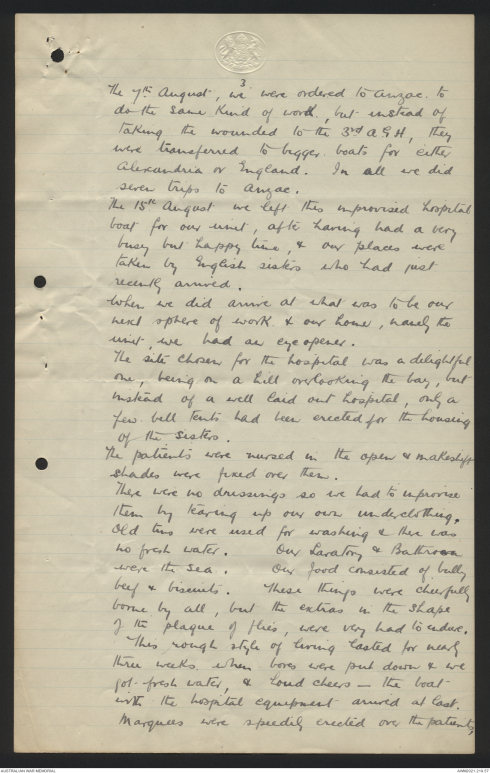
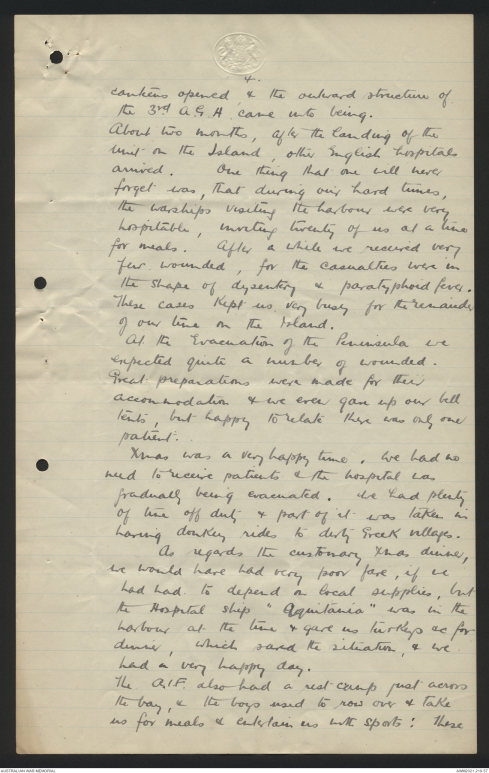
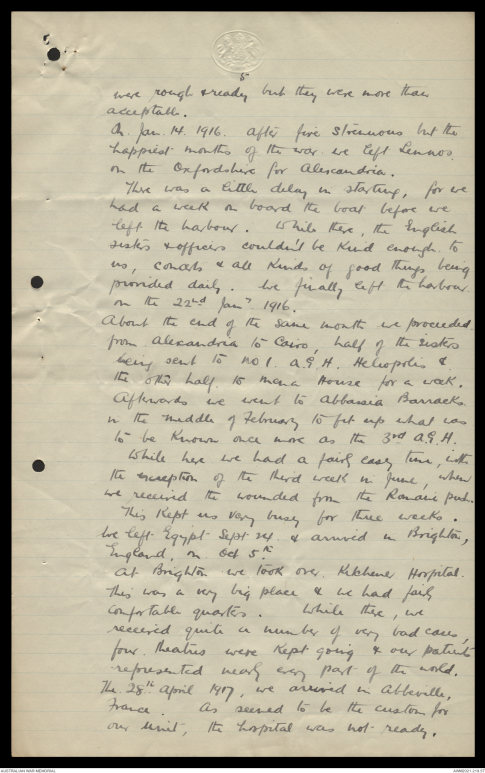
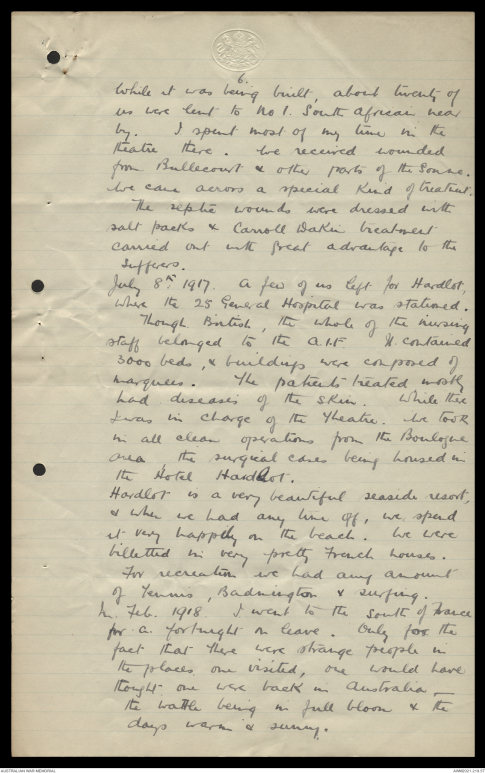
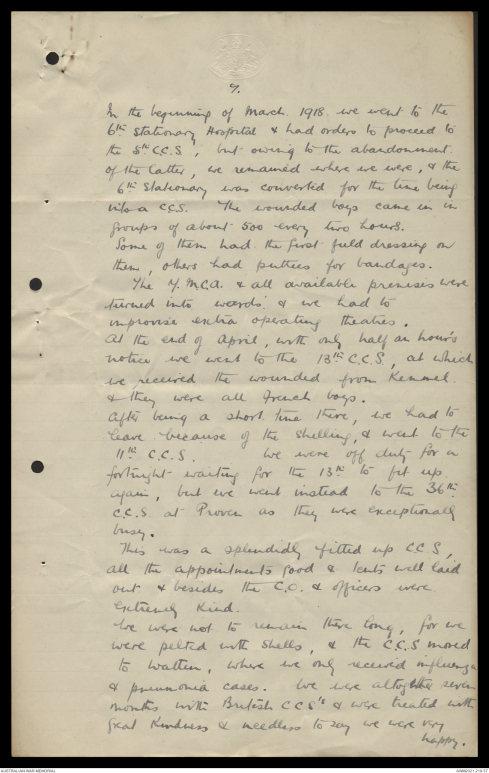
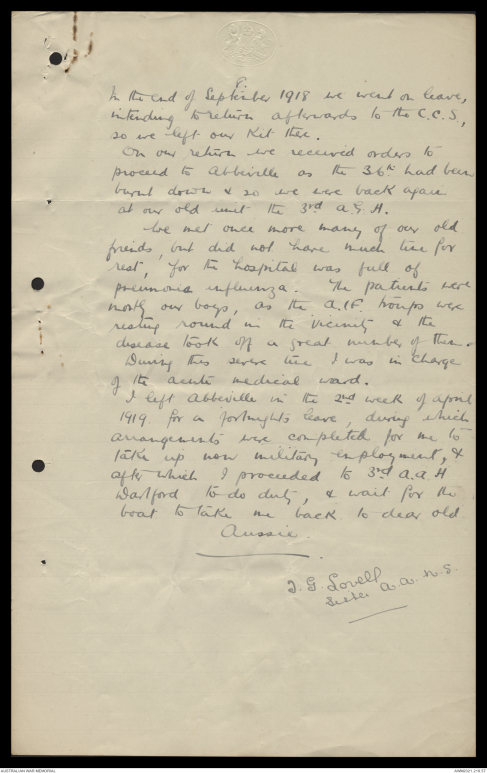
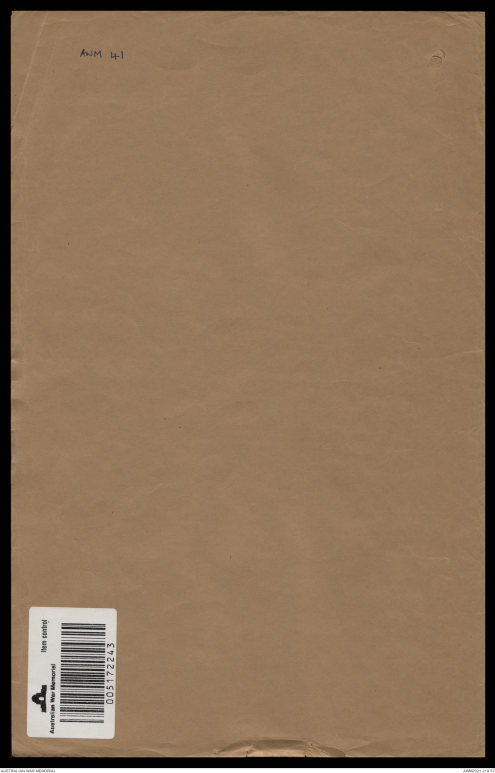
6/89
Butler Colln.
WAR OF 1914-18
AWM 4 1
[6/20]AA
[[??]]
AWM 4 1
[*AUSTRALIAN ARCHIVES
ACCESS STATUS
OPEN*]
SISTER I.G. LOVELL.
[*A.W.M.
LIBRARY
Classn No 373.2
[998]*]
Hosp ships 80/41
C.C.S. Sr I Lovell
No 3 A.S.H.
Left in Hosp Ships "Dundas Castle"
transport to French base [[?]]
at Suvla Bay receiving wounded &
wounds frightful, some 10 days
old - fly blown and septic.
with No 3 A.G.H. at Lemnos
March 1915 to 6th Stat.Hosp
wounded coming in about
500 in every two hours
April to 13 C.C.S. - wounded
from Kemmel, all French.
To the 36th C.C.S. at Proven
excellent relations with
R.A.M.C. treated with
great kindness
The Official War Historian of the Commonwealth
Government (Dr. C. E. W. Bean), after his study of the
collection of private war records preserved in the Australian
War Memorial Library, wrote : -
"The private diaries in this collection furnish some of its most
valuable historical records, but, like all private memoirs which were
not compiled with any historical purpose, they should not be
regarded as first-hand evidence except where it is certain that they
are so. The diarist is almost always sincere in his desire to record
accurately, but he is subject to no obligation or inducement to
indicate whether he is recording his own observations or incidents
told him by friends or heard at third or fourth hand at the mess-table.
Thus, in some of the diaries in this collection, scenes described with
vivid detail, and without any warning that they are told at second
or third hand, have been found to be completely inaccurate in
important details. A certain number also have been written up
or revised long after the events, though doubtless usually from notes
made at the time. In most cases the student must rely on his
experience and on internal evidence to guide him in judging what is
and what is not likely to be historically accurate".
80A/41
The Third Australian General Hospital Unit, of which
I was a member, left the shores of Australia on
16th May 1915 by to R.M.S. Mooltan which also
carried a full complement of passengers.
The journey was by no means an idle one. The
morning was begun with physical exercises, the
instructor being the R.S.M.
Afterwards the sisters gave lectures to the orderlies
re bandaging & general ward nursing.
Col. Stawell & Major Sherwin, who had previous
army experience, gave us many valuable hints
regarding the treatment of bullet & shell wounds &c.
We arrived in England in the beginning of
July 1915. There seemed to be nothing for us
to do for the time being, & after reporting daily
were left to ourselves. After three weeks, the
unit was ordered to Alexandria & we went
on board the "Derflinger."
We began to realize that we were in for the
real thing, for we had 3000 soldiers with
us, all lights were extinguished at night,
& we had a submarine guard of 500 men.
We landed in Alexandria safe & well
& after spending a couple of days in the hotels,
proceeded by hospital ship "Dundas Castle"
to Lemnos Harbour, arriving there on August 4th.
The hospital was not ready, owing to the boat
from England with the equipment going astray &
we were transferred to a boat lying in the
harbour.
Aug 6th I with five other sisters were give ten
minutes notice to go to the small French boat
"Formosa." This was an emigrant ship,
2
all the crew being French & strange to say, there
was no English spoken. We found there
four English medical officers & a number of
orderlies. Our mode of boarding the vessel
was a very novel one for us for we were pulled
on board off a tender. Once we embarked
we had a very busy time.
We we working all night fitting the ship
for patients & for an operating theatre we had
a small cabin.
We left Lemnos at 5 pm. & arrived at Suvla
Bay at 1 a.m. the next morning. One might
mention something of interest here, for we wondered
why they did not send any wounded to us.
It appears that we were flying the French flag
& those on shore took no notice of us.
At length our ensign appeared above the
french one & wounded were sent to us about
5 p.m. The scene presented was rather
startling. Our own warships were all round
& firing salvos at the enemy, while enemy shell
& shrapnel was falling fast; & the wreck of
the first landing boat (the forepart being all
shattered) was lying near by.
We were receiving wounded all night &
terrible wounds they were - , the majority of them
were ten days old, flyblown & septic.
All were operated upon on admission &
the little theatre was kept busy all night,
- limbs, had they been able to have been
treated before & would have been saved, had
to be amputated. This boatload constituted
the first batch of wounded to the 3rd A.G.H.
We did these trips (one daily) in this boat
to Suvla & back.
3
The 7th August, we were ordered to Anzac to
do the same kind of work, but instead of
taking the wounded to the 3rd A.G.H. they
were transferred to bigger boats for either
Alexandria or England. In all we did
seven trips to Anzac.
The 15th August we left this improvised hospital
boat for our unit, after having had a very
busy but happy time, & our places were
taken by English sisters who had just
recently arrived.
When we did arrive at what was to be our
next sphere of work & our home, namely the
unit, we had an eye opener.
The site chosen for the hospital was a delightful
one, being on a hill overlooking the bay, but
instead of a well laid out hospital, only a
few bell tents had been erected for the housing
of the sisters.
The patients was nursed in the open & makeshift
shades were fixed over them.
There were no dressings so we had to improvise
them by tearing up our own underclothing,
Old tins were used for washing & there was
no fresh water. Our Lavatory & Bathroom
were the sea. Our food consisted of bully
beef & biscuits. These things were cheerfully
borne by all, but the extras in the shape
of the plague of flies, were very hard to endure.
This rough style of living lasted for nearly
three weeks, when bores were put down & we
got fresh water, & loud cheers – the boat
with the hospital equipment arrived at last,
Marquees were speedily erected over the patients,
4.
canteens opened & the outward structure of
to 3rd A.G.H. came into being.
About two months, after the landing of the
unit on the Island, other English hospitals
arrived. One thing that one will never
forget was, that during our hard times,
the warships visiting the harbour were very
hospitable, inviting twenty of us at a time
for meals. After a while we received very
few wounded, for the casualties were in
the shape of dysentery & paratyphoid fever.
These cases kept us very busy for the remainder
of our time on Island.
At the Evacuation of the Peninsula we
expected quite a number of wounded.
Great preparations were made for their
accommodation & we even gave up our bell
tents, but happy to relate there was only one
patient.
Xmas was a very happy time. We had no
need to receive patients & the hospital was
gradually being evacuated. We had plenty
of time off duty & part of it was taken in
having donkey rides to dirty Greek villages.
As regards the customary Xmas dinner,
we would have had very poor fare, if we
had had to depend on local supplies, but
the Hospital ship "Aquitania" was in the
harbour at the time & gave us turkeys &c for
dinner, which saved the situation, & we
had a very happy day.
The A.I.F. also had a rest camp just across
the bay, & the boys used to row over & take
us for meals & entertain us with sports: these
5
were rough & ready but they were more than
acceptable.
On Jan. 14. 1916. after five strenuous but the
happiest months of the war we left Lemnos
on the Oxfordshire for Alexandria.
There was a little delay in starting, for we
had a week on board the boat before we
left the harbour. While there, the English
sisters & officers couldn't be kind enough to
us, concerts & all kinds of good things being
provided daily. We finally left the harbour
on the 22nd Jany 1916.
About the end of the same month we proceeded
from Alexandria to Cairo, half of the sisters
being sent to No 1 A.G.H. Heliopolis &
the other half to Mena House for a week.
Afterwards we went to Abbassia Barracks
in the middle of February to put up what was
to be known once more as the 3rd A.G.H.
While here we had a fairly easy time, with
the exception of the third week in June, when
we received the wounded from the Romani push
This kept us very busy for three weeks.
We left Egypt Sept 24 & arrived in Brighton,
England, on Oct 5th.
At Brighton we took over Kitchener Hospital.
This was a very big place & we had fairly
comfortable quarters. While there, we
received quite a number of very bad cases,
four theatres were kept going & our patients
represented nearly every part of the world.
The 28th April 1917, we arrived in Abbeville,
France. As seemed to be the custom for
our unit, the hospital was not ready,
6.
While it was being built, about twenty of
us were lent to No 1 South African near
by. I spent most of my time in the
theatre there. We received wounded
from Bullecourt & other parts of the Somme.
We came across a special kind of treatment.
The septic wounds were dressed with
salt packs & Carroll Dakin treatment
carried out with great advantage to the
sufferers.
July 8th 1917. A few of us left for Hardlot
where the 25 General Hospital was stationed.
Though British, the whole of the nursing
staff belonged to the A.I.F. & contained
3000 beds, & buildings were composed of
marquees. The patients treated mostly
had diseases of the skin. While there
I was in charge of the theatre. We took
in all clean operations from the Boulogne
area, the surgical cases being housed in
the Hotel Hardlot.
Hardlot is a very beautiful seaside resort,
& when we had any time off, we spend
it very happily on the beach. We were
billetted in very pretty French houses.
For recreation we had any amount
of tennis, Badminton & surfing.
In Feb. 1918. I went to the south of France
for a fortnight on leave. Only for the
fact that there were strange people in
the places one visited, one would have
thought one were back in Australia -
the wattle being in full bloom & the
days warm & sunny.
7.
In the beginning of March 1918 we went to the
6th Stationary Hospital & had orders to proceed to
to 5th C.C.S, but owing to the abandonment
of the latter, we remained where we were, & the
6th Stationary was converted for the time being
into a C.C.S. The wounded boys came in in
groups of about 500 every two hours.
Some of them had the first field dressing on
them, others had puttees for bandages.
The Y.M.C.A. & all available premises were
turned into wards & we had to
improvise extra operating theatres.
At the end of April, with only half an hour's
notice we went to the 13th C.C.S., at which
we received the wounded from Kemmel
& they were all French boys.
After being a short time there, we had to
leave because of the shelling, & went to the
11th C.C.S. We were off duty for a
fortnight waiting for the 13th to fit up
again, but we went instead to the 36th
C.C.S at Proven as they were exceptionally
busy.
This was a splendidly fitted up C.C.S.,
all the appointments good & tents well laid
out & besides the C.O. & officers were
extremely kind.
We were not to remain there long, for we
were pelted with shells, & the C.C.S moved
to Walten, where we only received influenza
& pneumonia cases. We were altogether seven
months with British CCS's & were treated with
great kindness & needless to say we were very
happy.
8.
In the end of September 1918 we went on leave,
intending to return afterwards to the C.C.S.,
so we left our kit there.
On our return we received orders to
proceed to Abbeville as the 36th had been
burnt down & so we were back again
at our old unit the 3rd A.G.H.
We met once more many of our old
friends, but did not have much time for
rest, for the hospital was full of
pneumonic influenza. The patients were
mostly our boys, as the A.I.F. troops were
resting round in the vicinity & the
disease took off a great number of them.
During this severe time I was in charge
of the acute medical ward.
I left Abbeville in the 2nd week of April
1919 for a fortnight's leave, during which
arrangements were completed for me to
take up non military employment, &
after which I proceeded to 3rd A.A.H.
Dartford to do duty, & wait for the
boat to take me back to dear old
Aussie.
I.G. Lovell
Sister A.A.N.S.
AWM 41
Item control
Australian War Memorial
005172243
 Maralyn K
Maralyn KThis transcription item is now locked to you for editing. To release the lock either Save your changes or Cancel.
This lock will be automatically released after 60 minutes of inactivity.